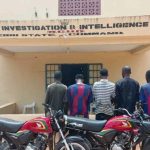The Kano State Government has commenced the training of 380 volunteer youths recruited as members of the Special Anti-Phone Snatching and VIP Protection Guards.
The training, currently underway at the Kano State Corporate Security Institute, Gabasawa, represents the first phase of the 600 youths enlisted under the initiative.
This was disclosed in a statement issued by the Director of Public Relations and Enlightenment, Ministry of Internal Security and Special Services, Malam Muhammad Idris, on Monday in Kano.
“The trainees represent the first batch of 600 volunteers recruited to serve as members of the Special Anti-Phone Snatching and VIP Protection Guards.
“The training is designed to equip the youths with the skills and discipline needed to support security agencies in maintaining peace and order across the state,” Idris said.
Receiving the trainees, the Commandant of the institute, retired Capt. Muhammad Bello Mai Gaskiya, explained that the programme was designed to provide paramilitary training to address rising urban crimes, particularly phone snatching and thuggery in Kano metropolis.
According to him, the programme will cover phone snatching prevention, VIP protection, defensive driving, drug abuse sensitisation by the National Drug Law Enforcement Agency (NDLEA), counselling sessions by Hisbah personnel, parade drills, and physical fitness training.
Mai Gaskiya urged the participants to take the training seriously, stressing that their role would be crucial in restoring order and security in communities across the state.
He further noted that upon completion of the two-week intensive training, the volunteers would be absorbed by the state government and provided with a modest monthly stipend.
The rising cases of thuggery and phone snatching in Kano’s urban areas have become a source of concern for many residents, with most victims losing not just their phones but also sustaining injuries that leave lasting scars.
Incidents involving either phone theft or violent clashes among rival gangs are now reported almost daily in several areas across the state. Various locations have increasingly been marked as hotspots, especially at night, with residents advised to avoid such routes after dark due to the heightened risks.





